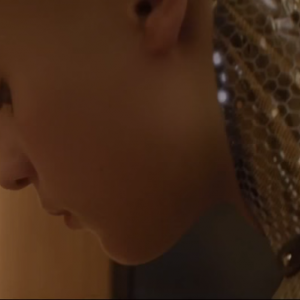aNewDomain  — Lots of people know Noel Sharkey as a judge on Robot Wars, or as the outspoken roboticist who’s long weighed in on how humans should and shouldn’t rely on AI and robots in matters of weaponry and war.
— Lots of people know Noel Sharkey as a judge on Robot Wars, or as the outspoken roboticist who’s long weighed in on how humans should and shouldn’t rely on AI and robots in matters of weaponry and war.
But Sharkey, who co-founded The Foundation for Responsible Robotics (FRR), is about to get famous for something even more on the edge: as an expert in the new and exploding field of sex robotics.
Sex robots are on their way, say Sharkey and FRR co-founder Aimee van Wynsberghe in a new report FRR released this week. Our Sexual Future With Robots, takes a long, hard look at sex bot technology and what it might mean for humans and society at large.
The report, which sets out to present an objective view of the many issues sex bots bring up, doesn’t get into the sci-fi stuff, where robots have souls, real personalities, rights and so on. It focuses on the near-term pros and con s of what’s ahead in five or 10 years.
s of what’s ahead in five or 10 years.
After all, roboticized sex dolls Abyss Creations’ Harmony, Sex Bot Company’s Suzie Software and Harry Harddrive and Android, and Love Dolls’ eponymous offering, to name just three, are already on the market. At $5K to $15K, they’re pricey. But they’ll get way more sophisticated and affordable before you know it, just as Moore’s Law dictates.
That is to say, the sex bots are coming.
READ Ex Machina: Your Hot, Fake, Naked Woman Will See You Now
Rather than preach or pontificate, Sharkey and van Wynsberghe survey the field, gathering up and presenting what some of the field’s leading thinkers, designers and ethicists are saying on such heavy issues as sex bots and crime, isolation, emotions, loneliness, ethics, gender relations, human emotions and more.
 It’s a great, thought-provoking read.
It’s a great, thought-provoking read.
Scroll below the fold to read it for yourself. Here’s my summary of some of its most salient points.
Q. Would people have sex with a robot?
Short answer: Not everyone, but probably enough to justify a business.
In their poll of 100 American men and women in 2016, Tufts University Matthias Scheutz and Thomas Arnold found that, of 57 men and 43 women they surveyed, 86 percent thought sex robots could “satisfy sexual desire,” as the authors point out.
All in all, two-thirds of the women were against the idea, compared to only one third of the men.
 And in a Nesta FutureFest survey of 1002 UK young adults in the same year, 17 percent of respondents said they “would be prepared to go on a date with a robot.” That number swelled to 26 percent if such a robot looked exactly like a human, according to that research.
And in a Nesta FutureFest survey of 1002 UK young adults in the same year, 17 percent of respondents said they “would be prepared to go on a date with a robot.” That number swelled to 26 percent if such a robot looked exactly like a human, according to that research.
But those results differ widely from what Huffington Post pollsters found in their survey of 1000 American adults in 2013. Researchers reported merely nine percent of respondents said they would have sex with robots if available.
Why all the variation? This could in part be due to the way to the way surveyors phrased the questions, say Sharkey and van Wynsberghe.
Or it could be due to just differences between individuals. Or, this is me speculating here, it could be people are embarrassed to admit their imagined affinity for lovers of the Silicon kind. Or maybe they are loathe to admit their revulsion, for fear of sounding prudish.
At any rate, the jury is still out on this one. What’s clear is that there appears to be at least a core male market for these things — and a non-invisible female one, too.
Q. What kind of relationship could we have with a sex robot?
Short answer: Better than you may think — and one based on “pretense and fantasy.”
 “We have scholars telling us that the relationship afforded by sex robots is one sided; that it ignores ‘the deep and nuanced notions of love and the concord of true friendship’ and will do nothing for our moral growth.
“We have scholars telling us that the relationship afforded by sex robots is one sided; that it ignores ‘the deep and nuanced notions of love and the concord of true friendship’ and will do nothing for our moral growth.
They say that the best robots could do is ‘fake it’ and this will not be like the full presence and engagement required for ‘complete sex’ in which we desire to be desired and, still more completely, we desire that our desire be desired,” write Sharkey and van Wynsberghe.
But this, they point out, is in contrast to the story sex workers tell.
“We have heard from sex workers, that even though their relationship with clients is a financial one, many clients still want the pretense of a relationship. They want more than a fake orgasm, they ‘want to get inside the heads’ of the worker. They want her to party with them and pretend that they are in a genuine relationship.
“Pretense and fantasy are perhaps the key to an answer about the kind of relationship that could be had with a sex robot,” they say.
In the foreseeable future, they point out, it’s unlikely robots will be able to live up to “the performance and theatrics of a good professional sex worker .. or be able to party with them.”
 All that may be needed, they note, is performance that’s good enough to help a customer suspend disbelief, if only for a little while.
All that may be needed, they note, is performance that’s good enough to help a customer suspend disbelief, if only for a little while.
While all of this may seem appeal from a human’s rights perspective — no human sex workers needed in this fiction — there’s one ethics concern that the authors bring up that perhaps you have never considered. This ethical concern, they say, lies “in the deception of the vulnerable.”
They add:
“Deception is a nuanced concept when it comes to our relationship with artifacts. Is the (sex robot) constructed to enable a fictional relationship that we desire or … is it deceiving us into believing that the relationship is two sided?”
I wonder that all the time.
Q. Will robot sex workers and bordellos be acceptable?
Short answer: Acceptable, yes. And probably inevitable.
Acceptable, yes. And probably inevitable.
There are as yet no robot brothels, Sharkey and van Wynsberghe tell us. But there’s credence in one research study’s 2012 prediction that Amsterdam’s Red Light District will have robot sex workers plying their wares by 2050, if not sooner.
In Asia right now, for instance, there already exists a type of brothel that is known as a “sex doll brothel,” they say. The idea has been so successful, they add, that now a similar brothel is soon to open in Barcelona.
If static sex dolls do turn out to work in Europe, and not just as a novelty thing in Asia, then the future looks certain: Robot sex brothels are going to make someone an awful lot of money.
Q. Could intimacy with robots lead to greater social isolation?
Short answer: Of course.
But you knew that.
Q. Could robots help with sexual healing and therapy?
Short answer: Yes, just not in the way Marvin Gaye intended.
 Could sex robots help humans with sexual problems or those who are too sick or elderly to find or satisfy real partners? That’s a question the authors examine deeply in this report, and they look at all sides of the discussion.
Could sex robots help humans with sexual problems or those who are too sick or elderly to find or satisfy real partners? That’s a question the authors examine deeply in this report, and they look at all sides of the discussion.
On the pro side, there’s David Levy, who writes in his book, Love and Sex with Robots, that “many who would otherwise have become social misfits, social outcasts, or even worse will instead be better balanced human beings.” (Read an excerpt from Levy’s book on the matter below the fold.
The UK Human Rights Act 1998 and the Equality Act 2010, they add, makes it illegal “not to support disabled people to enjoy the same pleasures as others enjoy in the privacy of their own homes. Without intimate sexual companionship, people with disabilities could suffer loneliness and unhappiness.”
Then again, sex bots might have the effect of further isolating the sick and the aged. “They may prefer alternative services with sympathetic human sex workers specializing in disabilities such as TLC, a UK based charity for disabled men and women to find responsible sexual services,” they write.
 Further, they add, there’s a risk that those with dementia issues might begin believing their sex robot partner was the real thing.
Further, they add, there’s a risk that those with dementia issues might begin believing their sex robot partner was the real thing.
There is an excellent discussion around the “ethics of deceiving the vulnerable” in this regard, ethics that must be considered fully before anyone tries to deliver sexual healing in such a venue.
Q. Would sex robots help to reduce sex crimes?
Short answer: No. Stop saying that.
There are two camps on this argument. There are those who hold that satiating sexually criminal minds with sex robots is the answer. On the other side are people who believe exactly the opposite. The authors tackle both sides of the argument in what is this report’s most gripping subsection.
Their conclusion: “This may work for a few but it is a very dangerous path to tread.” It could well be, they add, that allowing people to live out their darkest fantasies with sex robots could have a pernicious effect on society and societal norms and create more danger for the vulnerable.”
 Consider one Japanese company’s creation of child sex dolls. Its developer, Shin Takag, is an admitted pedophile, they write, adding that he claims to have created the dolls to help keep individuals like him from harming children.
Consider one Japanese company’s creation of child sex dolls. Its developer, Shin Takag, is an admitted pedophile, they write, adding that he claims to have created the dolls to help keep individuals like him from harming children.
“We should accept that there is no way to change someone’s fetishes,” Takagi insisted to The Atlantic in 2016. “I am helping people express their desires, legally and ethically. It’s not worth living if you have to live with repressed desire.”
The authors carefully tread through various arguments on both sides of the argument. Georgia Tech robotics professor Ron Arkin, they point out, has argued that child sex dolls perhaps should be available — but only by prescription. But they weigh tis against comments from other academics, like MIT’s Kate Darling, who points out that researching whether that would even work would be costly. And after all, she says, “it isn’t easy to find a group of pedophiles willing to participate in research. Such a line of inquiry would also be likely to provoke objections from many corners…”
Most concerning, perhaps, is the cognitive-behavioral side of the question, which by definition suggests that products like the Japanese child sex doll potentially could be self-reinforcing and even increase the urgency of such desires.
Far and away the best response to child sex bots and other ideas supposing we just let technology help people act out their most criminal fantasies comes from Cal Poly robot ethicist Patrick Lin. In response to such arguments, he emailed Sharkey and van Wynsberghe the following:
“Treating pedophiles with robot sex children is both a dubious and repulsive idea. Imagine treating racism by letting a bigot abuse a brown robot. Would that work? Probably not. If expressing racist feelings is a cure for them, then we wouldn’t see much racism in the world.”
For aNewDomain, I’m Gina Smith.
Read the full FRR report on the future of sex and robotics, below.
Report: Our Sexual Future With Robots
Here’s a paper by Tufts University researchers Matthias Scheutz and Thomas Arnold referenced in today’s robot sex paper. From Tufts’ Human-Robot Interaction lab, it’s a 2016 paper called, “Are we ready for sex robots?” Read it below.
Are We Ready for Sex Robots? by Gina Smith on Scribd
Univ. of Miami researcher penned the following paper in 2012, which argues that the advent of sophisticated sex robots stands to harm women because they will further the dangerous idea that women are always-willing. Read it below.
The Roboticization of Consent by Gina Smith on Scribd
Check out this collection of papers from a 2007 Oxford Internet Institute gathering. One of them, David Levy’s “Falling In Love with a Companion” is a classic commentary on the intersection of AI, robotics and humans. Levy’s takeaway: That there is nothing about human love or expressions of loving emotions that couldn’t be engineered into a sex bot — and soon.
Falling In Love with a Companion by Gina Smith on Scribd
<
In this paper, which appears in the IEEE Transactions of Affective Computing journal, John P. Sullins takes issue with David Levy’s argument about the ease at which “anything about human love” and emotions could be engineered into bots. And he delves into the ethical implications around even trying. Another great read.
Robots, Love & Sex: The Ethics of Building a Love Machine by Gina Smith on Scribd
Will sex bots be the heroes that end human trafficking? Seems like a stretch. Even where prostitution is legal, sex trafficking remains as a result of their so-called customers having an appetite for the sorts of abuse that would never be regulated, a finding that traces back to research from the following NYU study:
NYU 2012 Paper: Human Trafficking and Regulating Prostitution by Gina Smith on Scribd
Here’s an article on the topic of sex bot to human contact, which delves into whether contact with a robot body would be in the least bit satisfying. The answer, according to the authors: Yes. Definitely.
Toward a Mechanical Body by Gina Smith on Scribd
Cover image: The Foundation for Responsible Robotics, All Rights Reserved: Inside images: Sex with Robots is Normal YouTube video, All Rights Reserved; VDSmaza.co, All Rights Reserved;













